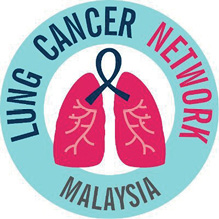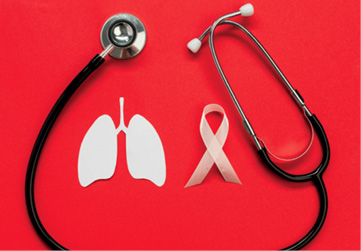
Dr Anand Sachithanandan
President, Lung Cancer Network Malaysia
IN RECENT YEARS, Malaysia has become a leading and preferred health tourist destination in the region due to its diverse medical expertise, state-of-the-art facilities and relative affordability.
Lung Cancer Network Malaysia (LCNM) President Dr Anand Sachithanandan said healthcare, however, like all other sectors of the economy and life in general, has been severely disrupted by the Covid-19 pandemic. Driven by our world-class vaccination programme these past months, Malaysia can hopefully transition to a new normal of endemic status.

“With sensible but measured precautions in place, hopefully, we can ‘open up’ and regain our standing as a top regional healthcare provider for both locals and tourists,” said Dr Anand.
“Health literacy and awareness have improved considerably as a consequence of Covid-19. As a nation, we must leverage on this and make provision of quality healthcare services a priority.”
So how has the pandemic affected lung cancer treatment, care and management?
Dr Anand, a consultant cardiothoracic surgeon, said lung cancer remains a leading cancer. It is the commonest cause of cancer-related deaths in Malaysian men. In women, only breast cancer is more deadly.
“Outcomes or survival is poor as we are burdened with advanced-stage disease, with almost 95 per cent of cases being diagnosed in Stages 3 or 4.
“Unfortunately, the pandemic has exacerbated this. We can expect to see more cases of late-stage presentation and diagnosis due to the various disruptions and delays in the provision of cancer services.”
He added that the MCO or lockdowns, the ‘stay-at-home’ mantra, re-purposing of hospitals as Covid-19 facilities and even redeployment of hospital staff to other areas to battle Covid.
Covid-19 has negatively impacted cancer services and increased the backlog of cases awaiting definitive diagnosis and appropriate treatment.
Asked on what could be done to start mitigating the adverse effects of the pandemic on cancer treatment, care and management, Dr Anand said the progression of any cancer, especially lung cancer, from an early to late-stage was a real and serious concern.
Healthcare budget must increase
“This underscores the importance of a prompt and timely diagnosis. In general, early-stage disease is more amenable to curative therapies, more cost-effective and associated with vastly better survival.
“Our healthcare budget expenditure as a proportion of GDP is too low and must be increased significantly. Modern cancer care is highly efficacious but very costly.
“Appropriate funding must be made available and ring-fenced to finance an efficient and comprehensive cancer service, including screening of high-risk or at-risk groups.
“For lung cancer, this will be low dose CT (LDCT) screening of those with a significant smoking history and perhaps even non-smokers who have a significant family history of the disease.”
During the pandemic’s peak in Malaysia, Dr Anand said that there was an unprecedented collaboration between the government (public) hospitals and private facilities to help decant the former at short notice.
He added we should build on such collaborations and develop a more integrated and impactful public-private partnership to provide better healthcare for all, leveraging the vast expertise, experience and first-class facilities available in the private sector.
This requires political will and dedicated funding for quality and timely cancer services and treatment.
“However, such collaboration must be fair and transparent to make it sustainable and effective.
“With an appropriate framework, waiting list initiatives can be undertaken to deal with the expected and rising backlog of screenings, surveillance scans, outstanding therapies (eg. chemoradiotherapy) and semi-urgent surgeries as required.”
He said Malaysia should become more innovative and inclusive in its clinical practice. Several tertiary private hospitals with a comprehensive one-stop service can be easily identified and designated as organ-specific cancer centres of excellence. These can function as a referral centre based on a hub and spoke model to help provide timely and high-quality service.
Multi-disciplinary aspect of oncology care
The optimal care and outcome for many cancers, especially lung cancer, often requires a multi-disciplinary approach with input from various specialists and a combination of treatments (multi-modality) to achieve a cure or good long-term disease-free survival.
It is the cornerstone of good patient-centric cancer care and takes the form of multi-disciplinary tumour board meetings. Throughout the pandemic, such meetings persisted but were conducted remotely on virtual platforms. It ensured cancer patients continued to receive appropriate quality care based on a consensus of expert opinions.
Dr Anand also spoke on the significant changes or innovations developed during the pandemic to enable continuous cancer treatment and care services.
“Covid has expedited the process of digitisation and adoption of technology. In addition to virtual MDT or tumour board meetings to discuss optimal management of complex cancer cases, telemedicine has enabled the conduct of online or virtual clinic consultations to triage, reassure and monitor our cancer patients remotely.
He said adopting innovative and impactful technology was critical to delivering a contemporary, efficient and genuinely effective cancer service. The use of telemedicine, like virtual platforms for remote clinic consultations with patients and their families, and online multi-disciplinary tumour board meetings would ensure cancer patients continue to receive uninterrupted quality care, including expert opinions from elsewhere, if desired.
Artificial intelligence (AI) technology with deep-learning algorithms is another potential game-changer. LCNM is embarking on an exciting screening project for lung cancer out in the community using AI-driven analysis of chest X-rays.
“In my view, this ‘disruptive’ technology holds immense potential to enhance diagnostic accuracy and expedite the referral pathway so that we can swiftly get any patient with suspected lung cancer in the hands of the relevant specialist.
“With technology, we hope to reach and screen more rural populations in remote locations. Robotics is another area driving change in clinical practice. However, it is presently not so cost-effective, and long-term benefits need to be realised and firmly established before more widespread adoption.”
Important to adopt technology meaningfully
He added it was important that clinicians adopted technology meaningfully to provide impactful and cost-effective superior solutions to current treatments rather than create or follow a trend or gimmick.
Regarding lung cancer, Dr Anand said the emergence of genomics molecular profiling and scalable next-generation sequencing technology heralds the dawn of a new era of truly personalised precision medicine.
Identifying actionable driver mutations within the tumour allows use of highly-effective but expensive bespoke therapies, including immunotherapy and targeted oral therapies.
It has been challenging to manage lung cancer patients during the pandemic. Even when restrictions were lifted and with SOPs in place, the public and many patients were understandably reluctant to come to the hospital for screenings, routine check-ups or scheduled surveillance scans for fear of contracting the virus.
Close surveillance with a CT or PET scan is vital for any cancer, especially lung cancer, to monitor for recurrence after surgery and tumour progression or response to therapy.
The commonality of symptoms (eg. a cough or difficulty breathing) between Covid-19 and a possible lung cancer means many lung cancer cases might have been misdiagnosed as Covid-19, further delaying treatment.
Lung cancer patients after major surgery or those on active treatment (eg. chemotherapy or immunotherapy /targeted therapy) are particularly vulnerable to a more severe Covid-19 infection due to less pulmonary reserve or immunosuppression.
However, treatments must continue as the risk of cancer progression is real and serious and cannot be deferred till the pandemic passes.
The challenge has been to mitigate potential risks and provide treatments, including life-saving lung resection surgery, as safely as possible.
Strategies have included the use of PPE, dedicated Covid-19 operation theatres, meticulous pre-treatment PCR testing, delivery of more innovative outpatient treatments as oral therapies, and shorter in-patient therapies like hyper fractioned radiation therapy in addition to utilising technology for more remote or virtual consultations where possible. KHIRTINI K KUMARAN — The Health








